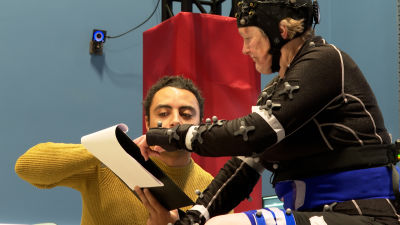Exeter University testing new 'life-changing device' for Parkinson's patients

Watch Charlotte Gay's exclusive report
A life-changing piece of wearable technology, which could transform the mobility of someone living with Parkinson's Disease, is being trialled at Exeter University.
The leg bands help people with Parkinson’s combat their walking challenges such as the debilitating “freezing of gait”.
This symptom can leave people feeling that their feet are stuck to the ground, meaning they have difficulty walking.
People in the trial are wearing these bands with muscle-vibrating pods resting on the backs of their legs, which send out vibrational cues guiding them through their steps.
It's part of a £1.4m project between Exeter and Oxford University and their funded company gaitQ.
Jane Rideout from Honiton is one of the first people to use the state-of-the-art devices and says the trial has "helped my Parkinson's enormously".
Jane said: "I used to freeze a lot [but now when] I get stuck I can actually get out of the freeze more easily because I've been taught techniques."
So far the testing has been held inside Exeter University's cutting-edge VSimulators facility, at Exeter Science Park.
It uses flexible space, including a moving floor, to simulate real-world environments, enabling the team to scrutinise the device's efficacy.
Professor Helen Dawes, who specialises in rehabilitation at Exeter’s Medical School, says for people living with Parkinson's Disease activities that are "fairly automatic" for us "start to become more difficult".
Professor Dawes said: "So what this means is it becomes harder to walk in complex environments because your brain's normally looking around and seeing what's going on and it's having to focus more on moving."
Jane says she's keen for the next stage where she can take it out into the "real world" because she's avoided going to places like supermarkets that have become too overwhelming.
She said: "It's difficult for me to know whether it's going to work well for me when I'm really in trouble.
"And normally within 10 minutes of being in a supermarket, I start to freeze and start to have a stuttering movement to my feet."
Dr Dongli Li is the founder of the gaitQ device.
She says it's hoped the leg bands will be useful for more than just those combating the symptoms of Parkinson's.
Dr Li said: “This research will be of interest to people who experience gait difficulties, such as people with Parkinson’s, and people recovering from stroke, and hip or knee replacement.
"We aim to help them walk better, have lower fall risk, and live more actively and independently.”